Santosh Srivastava
A Benchmark for Generalizable and Interpretable Temporal Question Answering over Knowledge Bases
Jan 15, 2022
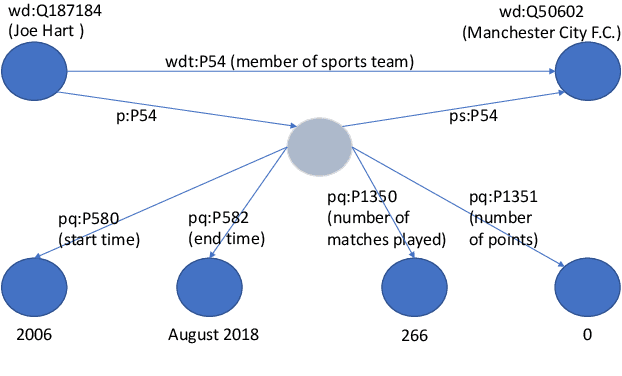


Abstract:Knowledge Base Question Answering (KBQA) tasks that involve complex reasoning are emerging as an important research direction. However, most existing KBQA datasets focus primarily on generic multi-hop reasoning over explicit facts, largely ignoring other reasoning types such as temporal, spatial, and taxonomic reasoning. In this paper, we present a benchmark dataset for temporal reasoning, TempQA-WD, to encourage research in extending the present approaches to target a more challenging set of complex reasoning tasks. Specifically, our benchmark is a temporal question answering dataset with the following advantages: (a) it is based on Wikidata, which is the most frequently curated, openly available knowledge base, (b) it includes intermediate sparql queries to facilitate the evaluation of semantic parsing based approaches for KBQA, and (c) it generalizes to multiple knowledge bases: Freebase and Wikidata. The TempQA-WD dataset is available at https://github.com/IBM/tempqa-wd.
SYGMA: System for Generalizable Modular Question Answering OverKnowledge Bases
Sep 28, 2021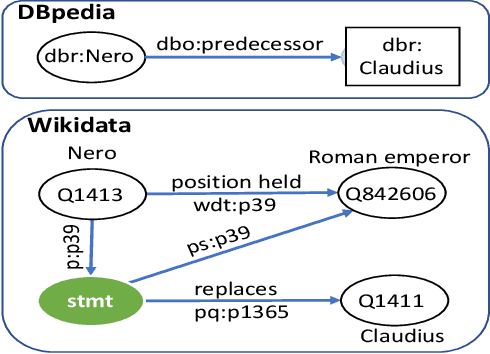
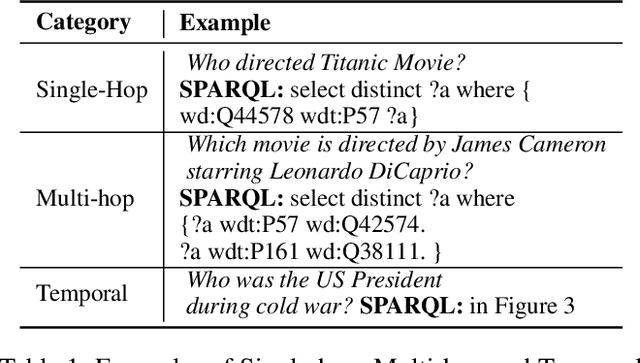


Abstract:Knowledge Base Question Answering (KBQA) tasks that in-volve complex reasoning are emerging as an important re-search direction. However, most KBQA systems struggle withgeneralizability, particularly on two dimensions: (a) acrossmultiple reasoning types where both datasets and systems haveprimarily focused on multi-hop reasoning, and (b) across mul-tiple knowledge bases, where KBQA approaches are specif-ically tuned to a single knowledge base. In this paper, wepresent SYGMA, a modular approach facilitating general-izability across multiple knowledge bases and multiple rea-soning types. Specifically, SYGMA contains three high levelmodules: 1) KB-agnostic question understanding module thatis common across KBs 2) Rules to support additional reason-ing types and 3) KB-specific question mapping and answeringmodule to address the KB-specific aspects of the answer ex-traction. We demonstrate effectiveness of our system by evalu-ating on datasets belonging to two distinct knowledge bases,DBpedia and Wikidata. In addition, to demonstrate extensi-bility to additional reasoning types we evaluate on multi-hopreasoning datasets and a new Temporal KBQA benchmarkdataset on Wikidata, namedTempQA-WD1, introduced in thispaper. We show that our generalizable approach has bettercompetetive performance on multiple datasets on DBpediaand Wikidata that requires both multi-hop and temporal rea-soning
Logical Neural Networks
Jun 23, 2020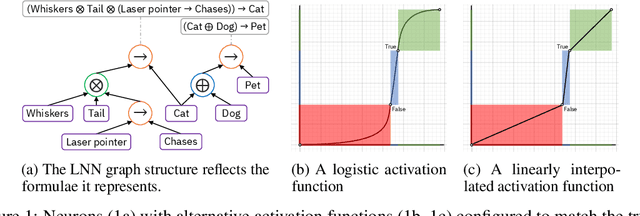

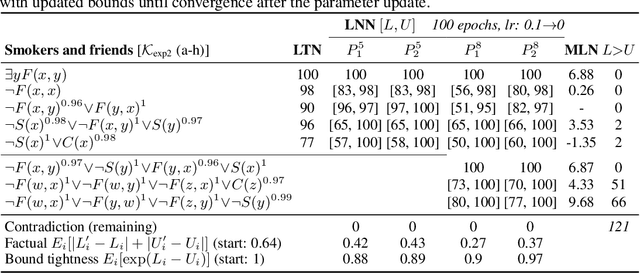

Abstract:We propose a novel framework seamlessly providing key properties of both neural nets (learning) and symbolic logic (knowledge and reasoning). Every neuron has a meaning as a component of a formula in a weighted real-valued logic, yielding a highly intepretable disentangled representation. Inference is omnidirectional rather than focused on predefined target variables, and corresponds to logical reasoning, including classical first-order logic theorem proving as a special case. The model is end-to-end differentiable, and learning minimizes a novel loss function capturing logical contradiction, yielding resilience to inconsistent knowledge. It also enables the open-world assumption by maintaining bounds on truth values which can have probabilistic semantics, yielding resilience to incomplete knowledge.
 Add to Chrome
Add to Chrome Add to Firefox
Add to Firefox Add to Edge
Add to Edge